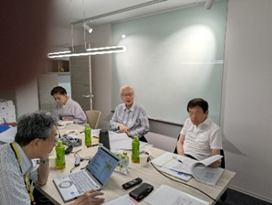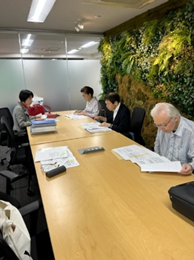After Completing the 5th Kyoto Love Letter Competition
Yoshie Doi
 
Judging Committee June 23, 2024 |
It has been 15 years since the “Love Letter to Kyoto” public competition began in 2009. The 5th “Love Letter to Kyoto” public competition closed its application period in March 2024, and the winning works were selected after a total of four careful judging processes, including three rounds of judging by the judging committee and a public vote. The winners will be announced next week in mid-July.
The documents are reviewed twice, and the final awards are decided by the judging committee. I am grateful to the judges who read the documents over and over again. They are all extremely busy, so when I received an email at 3am, I was so grateful that I couldn’t help but join my hands in prayer. When I read the comments, I thought of the background of the work with the same feelings as the submitter and nodded in agreement.
This love letter competition for Kyoto was born from the Kyo-Suzume School curriculum, “Love Stories of Kyoto.” For the opening lecture, we invited Professor Kaori Kawabata, the president of the Yasunari Kawabata Memorial Museum, to give a talk on “Kyoto, the city that Yasunari loved.” We were deeply moved by his deep love for Kyoto. Professor Kaori Kawabata was appointed as the head of the judging committee, and the event began.
Through the courses that were taught by the writers and pioneers who loved Kyoto, I learned that Kyoto’s values are connected to global values, and that Kyoto’s role is to protect and pass on both its nature and culture.
The general voters also commented, “I thought it was a good idea. I thought it was something unique to Kyoto. I hope it spreads nationwide. I look forward to seeing more of this ‘leading man of ancient Kyoto.'” and “There were a lot of great works. I was able to immerse myself in the charm of Kyoto once again.”
A researcher from a think tank living in the United States gave us some advice on the future direction of “Love Letter to Kyoto.” He said, “To know Japan is to know Kyoto. I think it’s important to send out the message to the world that ‘Get to know Kyoto and be happy,’ and to collect messages from all those who have visited Kyoto and make them publicly available to the world, so that both visitors and Japanese people can be happy.”
A person who makes policy recommendations to the President of the United States and leaders of countries around the world has said that knowing Japan is knowing Kyoto, so next time we would like to work towards receiving works from all over the world.
Kyo-suzume will also be celebrating its 25th anniversary in 2026, so we hope that the event will be just as exciting as the “Kyoto Love Writing Festival.” Thank you very much for your continued support.
The end of document
Translated by Masami Otani
